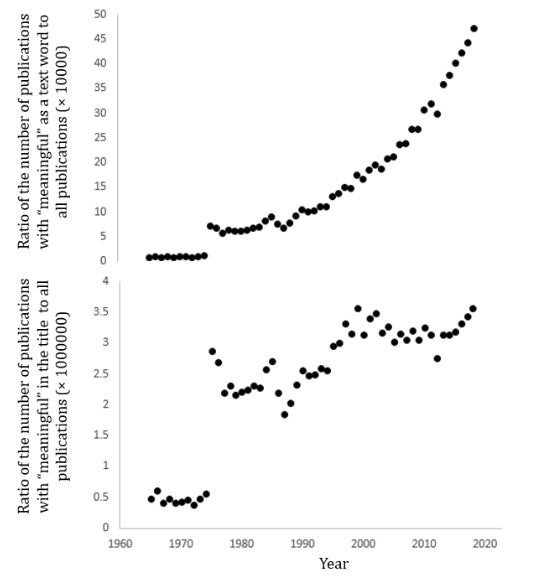 I suggested last week that “meaningful” more often means “meaningless” than any of the other possible meanings that it has acquired. As for the so-called “meaningful votes” in the House of Commons, is one to believe that all previous votes have been meaningless?
I suggested last week that “meaningful” more often means “meaningless” than any of the other possible meanings that it has acquired. As for the so-called “meaningful votes” in the House of Commons, is one to believe that all previous votes have been meaningless?
The Oxford English Dictionary (OED) offers several definitions of “meaningful”:
1 a. Full of meaning or expression, significant; communicating something that is not explicitly or directly expressed.
1 b. Having a serious, important, or recognizable quality or purpose.
2. Of a word, sound, etc.: conveying meaning; (Logic and Philosophy) compatible with the rules of a logical language or other sign system; able to function as a term in such a system.
3. Of data or its presentation: accurate and realistic; of practical use.
Those who coined the term “meaningful vote” seem to have had meaning 1a in mind.
Modern dictionaries are descriptive—their definitions reflect what those who use the words intend them to mean or think they mean. For example, “fulsome” originally (13thC) meant “characterized by abundance, possessing or affording copious supply”. Then it came to mean overgrown and rank, rather than simply abundant (17thC). Now, according to the OED, it is “chiefly used in reference to gross or excessive flattery, over-demonstrative affection, or the like”. And if enough people think that’s what it means, and use it often enough, then that’s what it means. Fortunately, no-one has yet invented the word “meaningfulsome”.
Collins English Dictionary gives a range of synonyms for “meaningful”:
- in the sense of significant: important, serious, material, useful, relevant, valid, worthwhile, purposeful;
- in the sense of expressive: suggestive, meaning, pointed, speaking, pregnant;
- in the sense of important: significant, critical, substantial, grave, urgent, serious, material, signal, primary, far-reaching, momentous, seminal, weighty, of substance, salient, noteworthy;
- in the sense of material: relevant, important, significant, essential, vital, key, serious, grave, meaningful, applicable, indispensable, momentous, weighty, pertinent, consequential, apposite, apropos, germane.
The frequencies with which the term “meaningful” appears in bioscience papers are shown in Figure 1. It was uncommonly used before 1975, but then, for no obvious reason, its use burgeoned. “Clinically meaningful” [or “medically meaningful” or “therapeutically meaningful”] occurs in just over 15% of all cases (10% of titles), when “clinically relevant” or “clinically important”, which is what it can be taken to mean in most cases, might be better. There are also a few instances of “clinically meaningful difference”. By contrast, “statistically meaningful” occurs less than 1% of the time.

Figure 1. Instances of “meaningful” in bioscience publications (source PubMed) as a fraction of all publications 1965–2018; top panel “meaningful” as a text word—between 1946 and 1974 there were 270 instances in all, but in 1975 alone 178; bottom panel “meaningful” in titles
Occasionally, “meaningful” is criticized. An excellent example is to be found in a 1971 issue of the journal Science, highlighting a requirement of the US Food and Drug Administration (FDA) that the effectiveness of a medicinal product should be demonstrated to be “clinically meaningful”. In Table 1 I have summarized the authors’ cogent arguments against this usage. They ended their analysis thus: “We hope the scientific community will become aware of the FDA’s use of the phrase ‘clinically meaningful’ and respond in a positive fashion to this imminent regulatory development.” The FDA has continued to use the term “clinically meaningful” (currently over 1400 hits on their website). Freund & Preston have been cited relevantly only once. And if the data in Figure 1 are anything to go by, their exhortation seems to have fallen on generally deaf ears.
Table 1. A summary of comments by Freund & Preston on the FDA’s 1971 requirement for evidence of “clinically meaningful” effectiveness
|
With due deference to the several dictionaries that I have consulted, I suggest that there is another meaning of “meaningful”, one that I haven’t found in any of them, but which should, I think, be included: “Meaningless, used unintentionally in this sense by those who do not understand the meaning of ‘meaning’”.
Jeffrey Aronson is a clinical pharmacologist, working in the Centre for Evidence Based Medicine in Oxford’s Nuffield Department of Primary Care Health Sciences. He is also president emeritus of the British Pharmacological Society.
Competing interests: None declared.
